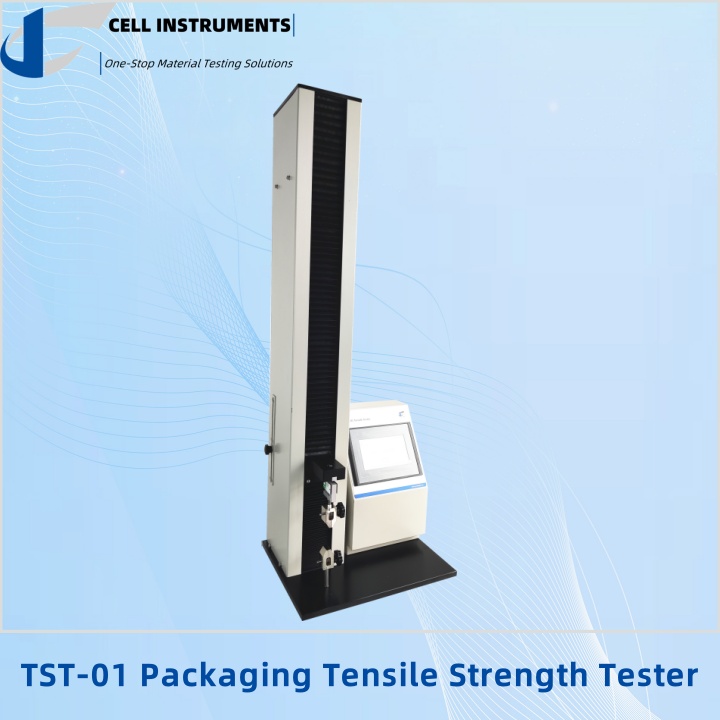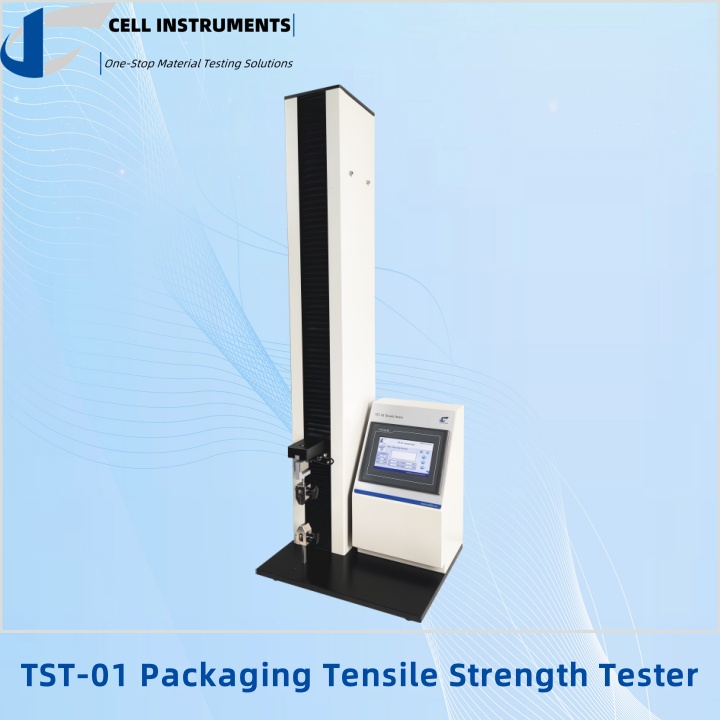TST-01 Packaging Tensile Strength Tester
- Standard: ISO 37, ASTM D638, ASTM D882, ASTM E4, ASTM D3330, ASTM F904,ASTM F88, ASTM D1938, JIS P8113
- Manufacturer: Cell Instruments
- Applications: Packaging materials, medical device materials, pharmaceutical testing, adhesives, textiles, paper and cardboard containers, and more.
- Customization: Available for special testing requirements and automation transformations
I. Introduction to the Packaging Tensile Strength Tester
The Packaging Tensile Strength Tester is a specialized instrument designed to test the mechanical properties of materials used in packaging, such as plastic films, composite materials, soft packaging, adhesive tapes, medical plasters, and non-woven fabrics. This machine assesses various parameters including tensile strength, elongation, tear resistance, and seal strength. These tests are crucial for packaging materials to meet industry standards and provide long-term reliability.
With the TST-01 Tensile Tester from Cell Instruments, manufacturers can evaluate and enhance the quality of their packaging materials, ensuring products remain safe and intact during shipment. By adhering to global standards, the tester is widely applicable across industries like food, pharmaceuticals, medical devices, adhesives, textiles, electronics, and more.
II. Applications of the Packaging Tensile Strength Tester
The Packaging Tensile Strength Tester is used across a variety of materials and industries. Some of the key applications include:
- Plastic Films: Testing tensile strength and elongation properties of plastic wraps and films used in packaging and sealing.
- Composite Materials and Soft Packaging: Measuring tear resistance and seal strength in multilayer packaging materials.
- Adhesive Tapes and Labels: Evaluating adhesive force, peel strength (90° and 180°), and durability.
- Medical Plasters and Protective Films: Ensuring the strength and elasticity of medical supplies and protective packaging.
- Non-Woven Fabrics and Paper: Testing tensile and tear strength for paper-based and fabric packaging solutions.
- Rubber and Aluminum Foil: Measuring the durability and tensile properties of flexible materials used in specialized packaging.
In each of these applications, the Packaging Tensile Strength Tester plays a vital role in quality control, allowing manufacturers to prevent material failure, optimize design, and meet industry regulations.
III. Key Features of the Packaging Tensile Strength Tester
The TST-01 Tensile Tester boasts a range of features that make it a highly efficient and reliable tool for material testing:
- PLC Control System: Ensures industrial-level stability and precision, allowing accurate measurements and repeatability.
- HMI Touch Screen: A 7-inch intuitive interface simplifies operation, providing easy access to different test configurations and real-time data.
- Precision Ball Lead Screw Mechanism: Guarantees controlled displacement and speed, ensuring that the testing process is consistent and precise.
- Customizable Test Speed: Adjustable speeds ranging from 1 to 500mm/min accommodate different materials and test requirements.
- Multiple Fixtures: The tester is compatible with a wide variety of fixtures for testing various materials, making it adaptable to multiple testing needs.
- Data Output: Results can be displayed on the screen, printed (optional microprinter), or exported via RS232 for analysis through professional software.
- Safety Features: Equipped with a limiting device and automatic return function to prevent overloading and improve user safety.
These features make the TST-01 a highly adaptable and reliable solution for tensile strength testing across industries.
IV. Tensile Strength Testing Process
What is Tensile Strength Testing?
Tensile strength testing is a method used to determine how a material reacts to a stretching force. During the test, a sample material is pulled until it breaks, and key measurements such as tensile strength, elongation, and breaking force are recorded. These measurements provide insights into the material’s durability and performance under stress.
The Testing Process
- Sample Preparation: A sample of the material is cut according to the specific dimensions required for the test.
- Loading the Sample: The sample is securely clamped between two fixtures in the Packaging Tensile Strength Tester.
- Test Execution: The machine applies a controlled stretching force at a specific speed, increasing until the sample breaks.
- Data Collection: Throughout the test, the machine records key metrics, such as tensile force, elongation at break, and strain.
- Analysis of Results: Data is analyzed to assess whether the material meets the required standards for tensile strength, elongation, and other performance indicators.
This process ensures the material’s performance under actual stress conditions is evaluated, allowing manufacturers to make informed decisions about product design and packaging material selection.
V. Significance of Tensile Strength Testing
Tensile strength testing is critical for industries reliant on packaging to protect products. By ensuring that materials can withstand tension, manufacturers can prevent packaging failures that lead to product damage, wastage, and financial losses. Additionally, packaging materials that meet tensile strength standards can better protect contents from external forces, ensuring quality and safety for consumers.
VI. Standards for Packaging Tensile Strength Testing
Compliance with international testing standards ensures the reliability of tensile strength tests. The Packaging Tensile Strength Tester adheres to several important standards, including:
- ISO 37: Tests the tensile properties of rubber materials, ensuring they meet mechanical strength requirements.
- ASTM D882: Defines methods for testing the tensile properties of thin plastic sheeting.
- ASTM E4: Focuses on the verification of testing machine force measurement systems.
- ASTM D3330: Specifies methods for measuring the peel adhesion of pressure-sensitive tapes.
- ASTM F904: Covers the determination of peel strength for adhesives.
- ASTM F88: Measures seal strength in flexible packaging.
- ASTM D1938: Tests tear resistance in plastic films.
- JIS P8113: Specifies tensile strength testing for paper materials.
These standards help ensure that the Packaging Tensile Strength Tester provides accurate, reproducible results that are recognized internationally.
The Packaging Tensile Strength Tester is a vital tool in the packaging and materials industries, enabling manufacturers to test and improve the performance of their packaging solutions. From plastic films to adhesive tapes and medical packaging, tensile strength testing ensures that materials can withstand the rigors of real-world use, enhancing product safety and reliability. The TST-01 Tensile Tester by Cell Instruments offers advanced features, ease of use, and compliance with international standards, making it an essential component of any quality control process.
FAQs
Q1: What materials can be tested with the Packaging Tensile Strength Tester?
A1: The tester can handle a wide range of materials, including plastic films, adhesives, non-woven fabrics, aluminum foils, rubber, and paper.
Q2: What industries benefit from tensile strength testing?
A2: Tensile strength testing is essential in industries such as food, pharmaceuticals, medical devices, textiles, electronics, and packaging, where material durability is critical.
Q3: How does tensile strength testing improve product quality?
A3: By measuring how materials perform under stress, tensile strength testing helps manufacturers choose the right materials, improve product designs, and ensure packaging integrity during transport.
Q4: What is the difference between 90° and 180° peel testing?
A4: A 90° peel test measures the force required to peel a material at a right angle, while a 180° test measures the force required to peel it back flat against itself.
Q5: What standards does the Packaging Tensile Strength Tester comply with?
A5: The tester complies with standards such as ISO 37, ASTM D882, ASTM F88, ASTM D1938, and JIS P8113, ensuring reliable and accurate results.







